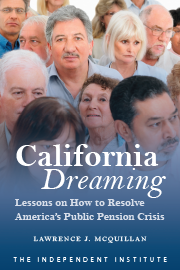Much has been written about the July death of Eric Garner, the 43-year-old black man who died after a New York City police officer put him in a chokehold during an arrest.
The New York City medical examiner ruled that Garner’s death was homicide, caused by the chokehold and compression to his chest. A grand jury will soon decide if criminal charges should be brought against officers.
Many people say his death is another case of white police brutality against black citizens. Lost in this public debate, though, is a key question: Why were police arresting Garner in the first place?
Was he robbing a store or attacking innocent citizens? No, police arrested Garner supposedly for selling untaxed cigarettes. The strong-arm arresting process claimed Garner’s life, all over the sale of 75-cent loose cigarettes or “loosies.”
High taxes produce underground markets for goods and services, and when these taxes are hiked, smuggling increases. Nowhere is this illustrated more clearly than in New York City.
In the name of cutting smoking rates, New York has the highest state cigarette tax at $4.35 per pack. New York City piles on an additional local cigarette tax of $1.50 per pack. Since 2006, the cigarette tax in New York state has been raised 190 percent. In response, cigarette smuggling there increased 59 percent. More than half of all cigarettes consumed in New York state are smuggled, according to a 2014 report by the Mackinac Center for Public Policy.
Garner chose to participate in the booming underground cigarette market as a smuggler. Since 2009, he had been arrested eight times for selling loosies, which are popular among people who can’t afford a full pack because of the excessive taxes.
In January 2014, tough new penalties for selling untaxed cigarettes took effect in New York City. In July, emboldened by the new law, the city’s highest-ranking uniformed cop, Philip Banks, issued an order to crack down on loosie sales days before Garner died.
These events confirm that police are ultimately the enforcers of the tax code, and every vote for higher taxes gives police increased authority to exert more force on citizens in more situations. Higher excise taxes inevitably lead to more violent clashes between police and smugglers.
Americans have a long tradition of smuggling to avoid taxes. Some Founding Fathers were smugglers. John Hancock, for example, operated one of the largest smuggling operations in the American Colonies in order to avoid British trade taxes. Hancock smuggled glass, paper, French molasses, Dutch tea, rum, wine and tobacco.
In some respects, the current situation is worse than Colonial times because Americans are imposing this oppressive, violent system on themselves. From black markets in cigarettes to black markets in drugs, today police ride herd over voluntary exchanges between individuals in American communities and kill smugglers on the streets. Garner was another victim of this immoral system—“collateral damage” in New York’s war on tobacco.
New York City Police Commissioner William Bratton wants the public to think that officer retraining on arrest procedures will fix the problem. However, Commissioner Bratton and other city officials choose to ignore the true cause: Current laws create too many situations that put police in conflict with citizens over consensual, nonviolent activities.
Eliminating punitive cigarette taxes would shrink the underground market and help redirect police resources to combating real crimes of force and violence, rather than empowering police to employ violence in the name of tax collection.









